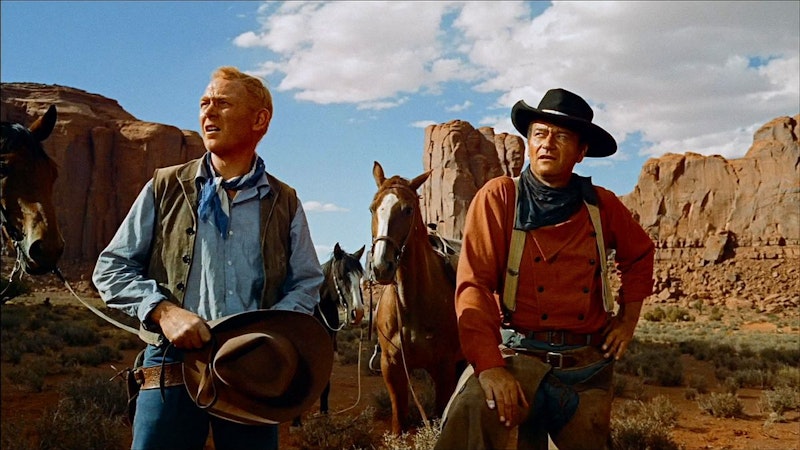Recently I stumbled across an interview except from Jean-Marie Straub, alongside his directing and romantic partner Danièle Huillet—that groundbreaking pair of filmmakers whose radical forms are matched only by their staunch, ideological content—wherein Straub observes a common misalignment of John Ford’s politics: “...I think that the reason why people call John Ford a fascist is that he is better at showing, for instance, what a settler was—when I saw The Searchers I understood better the attitude of the settlers in Algeria. I had really tried hard to understand them when I was in Paris during the Algerian war; when I saw the film by John Ford, the one that shows the setter and the Indian-hunter with a certain initial respect because he understands him. That is why people have said that he makes fascist films. In this sense, yes, but not in any other.”
Ford’s film has been canonized as an essential American text, both for its specificity in depicting the social relations of colonial violence, and its timeless abstraction of the western landscape. It’s at once immediate and emotional, yet unmoored from real time or real place—the West of The Searchers is nowhere and everywhere, it’s then and it’s now.
More than anything, audiences point to John Wayne’s towering performance as Ethan Edwards as being exemplary of the film’s ideology—whether critics naively assuming that the film’s political positions are aligned with that of its racist protagonist, or Ford’s scathing yet human critique of Ethan’s genocidal pathology. It's easy to see how a disengaged or disingenuous derider could make this mistake; one can always cite Wayne’s notorious 1971 Playboy interview where he stated that he believed in white supremacy, or the fact that he named his youngest son “Ethan” after his most genocidal character as evidence that the star’s beliefs aligned with Edwards. But Wayne isn’t Ford, just as Ford isn’t Ward Bond (Rev. Samuel Clayton in The Searchers), that other stock company member of Ford’s who, while Ford was shutting down Cecil B. DeMille’s attempts to get the DGA to name names, was working as a stooge for HUAC. Paraphrasing Straub, Ford was a great analyst of that specific brand of right-wing psychosis because he knew the psychotics so well.
Anytime that Wayne statement on white supremacy is brought up, the full quote should be used because he clearly explains what kind of white supremacist he is: “I believe in white supremacy until the blacks are educated to a point of responsibility. I don't believe in giving authority and positions of leadership and judgment to irresponsible people.” Wayne isn’t merely a white supremacist in favor of subjugation, which is so often implied and the default assumption for what “white supremacy” means, but is a white supremacist demanding homogenization.
Homogenization is a less obvious kind of violence than subjugation, yet it’s still an ideology of outright destruction, whether that’s a bout of liberal-friendly cultural integration, or the total annihilation of a people that either fail or refuse to do so. Here, we actually see a key difference between Wayne’s politics and Ethan’s. Ethan is the murderer, he’s the bloodthirsty weapon of racism, the figure so frighteningly effective at establishing a monopoly on violence that he doesn’t even have a place left for him in the white supremacist society he paved the way for in blood. Wayne isn’t that, he’s a showman in a safe little bubble, “serving” in WW2 by appearing in morale-boosting propaganda shorts and only getting his fists out when he’s demonstrating his masculinity to drunken friends on John Ford’s yacht. Wayne is much more like the Jorgensons, in particular Laurie (Vera Miles), who’s innate and outspoken racism is shown repeatedly throughout the film to be meaningless and arbitrary. Most obvious is her apparently giving up the belief that Debbie’s blood has been tainted after she was abducted by Comanches, when Laurie does not quietly object to Debbie (Natalie Wood) coming into the house in the final moments of the film the way they do Ethan.
Lest we forget that Laurie’s in love with Martin Pawley (Jeffrey Hunter), who Ethan often emphasizes as not his kin because Martin’s a quarter-Cherokee. Ethan and Laurie may talk about “blood” but what they’re really concerned with is communal loyalties—they’re masking a belief that their culture should be dominant for a fabricated ontology. Even they implicitly know the language doesn’t match the reality, showing “whiteness” not as an inherent quality but a mutable one, saying the woman abducted on captive raids “ain’t white” anymore or eventually accepting Martin as one of their own. They know the system they built to justify their “civilizing” of the land is illogical, and it makes their unblinking violence all the more terrifying.

